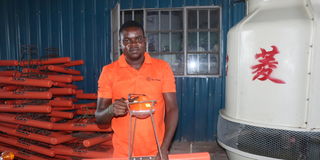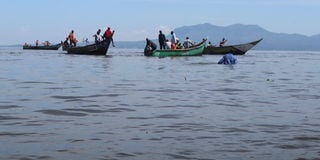How solar fishing lights are helping protect Lake Victoria

Kenneth Okungu displays a solar lantern that WeHub Victoria developed to promote the use of clean energy. Below: Fishermen in Lake Victoria. They use solar fishing lights at night.
What you need to know:
- About five years ago, most fishermen in Nyanza would use lamps that use paraffin. Fishermen reported that the lights, mainly pressure lamps would go off within a few hours after they cast their nets.
- As the paraffin burns, the lamps also emit smoke and the lake would be misty at daybreak when fishermen returned ashore.
A view of Lake Victoria at night is a different picture from what you would see during the day.
From a distance, the water surface, which by then is dark, is illuminated with tiny bright lights. It resembles the night sky with thousands of stars.
As you move closer, you will notice that the lights serve an important function in the lake. Bright lights are put on floats, mainly made of light wood or plastic, and placed in the lake to aid fishing.
Normally, fishermen use light to attract a small type of fish called silver cyprinid — popularly known as omena.
This fish is attracted by light and therefore fishermen use different sources of light at night to attract it.

Fishermen in Homa Bay County
Most fishermen use lamps and several thousands of these lamps are used in the lake every night for this purpose. About five years ago, most fishermen in Nyanza would use lamps that use paraffin. Fishermen reported that the lights, mainly pressure lamps would go off within a few hours after they cast their nets.
As the paraffin burns, the lamps also emit smoke and the lake would be misty at daybreak when fishermen returned ashore.
Mr Michael Odero, who has been a fisherman at Kiumba beach for 12 years, says the lake would have a pungent smell when they were fishing at night.
“One boat would have at least four pressure lamps around it. All of them emitted smoke that filled the air, making it difficult to breath,” he says.
Besides air pollution, some of the lights would get lost in the lake. Mr Odero says when this happens, some of the paraffin would spill in water, suffocating fish and other marine species.
A few years after the use of paraffin lamps got more popular and with unforeseen disadvantages, a few fishermen decided to switch to a different source of light.
Mr Odero was among those who chose to use a lead acid battery, which at some time was also popular in the lake.
He explains that fishermen would go to the lake with car batteries, bulbs and cables. “We would connect the wires to the bulb and the battery to get light. It worked for sometime before it was phased out,” he says.
The fishermen say the use of car batteries had several challenges including lack of knowledge to connect the lights, which led to mini explosions when bulbs were wrongly connected.
Some batteries also had less power that couldn’t last till the end of a fishing escapade.
Kevin Odhiambo, a fisherman who is based at Mbita beach, says cases of fire outbreaks in boats were common when the lamps would malfunction. There was a need for an alternative source of light, which could stay on for hours.
Their wish came true in March 2019 when a German company that promotes green energy developed a solar powered lantern that fishermen can use at night and charge it during the day.
Stories about the lights soon spread across the lake and most fishermen are now adopting its use.
The company called WeHub Victoria limited has since established 18 stations around Lake Victoria, where the lights are kept before fishermen pick them every evening when going fishing. The firm also designed plastic floats that the solar lanterns sit on as they drift on the lake surface while the light attracts omena towards them.
“Most fishermen still use wooden floats, which last for at least two months, and this threatens the environment when trees are cut to assemble them,” says the company’s director Tillman Straub.
The company has at least 5,000 pieces of the waterproof solar lights , which are given out to fishermen on a daily basis.
When fishermen are in need of the lantern, they go to WeTu offices, which are established by the company, and collect them.
They pay Sh70 to get a single unit; with one boat able to operate using between seven to 15 lanterns.
Most fishermen using the lights say it is cheaper and safer compared to using pressure lamps.
Mr Odhiambo uses 15 lights every day.
“We no longer have to look for paraffin when going to the lake. Besides, the solar lanterns are not bulky as the other light sources we have used in the past,” he says.
After collecting the lights, Mr Straub says fishermen go to the lake and return them to the WeTu station the following morning for recharge.
“The lights stay on for seven to 10 hours and aid fishermen in catching fish at night,” he says.
However, sometimes some of the solar lights do develop technical hitches when in use.
Mr Straub says it is mostly the battery that develops problems but after at least one year when being operated.
The company has partnered with other like-minded organisations in Nairobi that are able to repair batteries in order to extend the life of the lanterns.
“When the batteries are too weak, we replace them. But we can also give the battery a second life to make the lantern work for more years,” Mr Straub says.
WeHub Victoria limited has its own technicians who repair the lights to reduce unnecessary expenses on fishermen.
“When a system fails in the light, be it the battery of the LED light, we do not throw it away. We have technicians whose responsibility is to ensure the lights keep working,” Mr Straub says.





